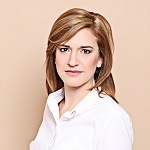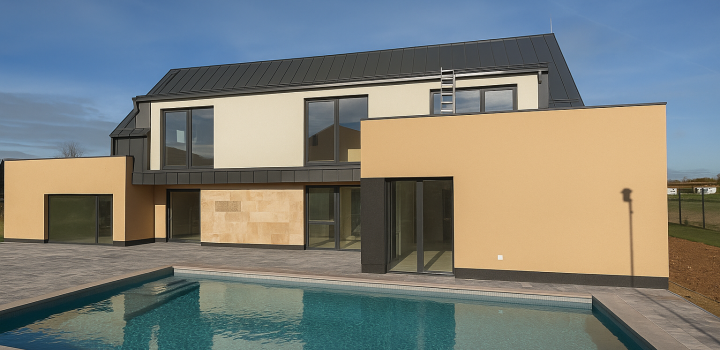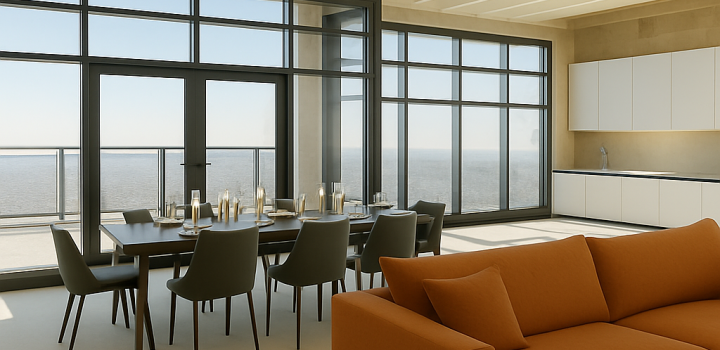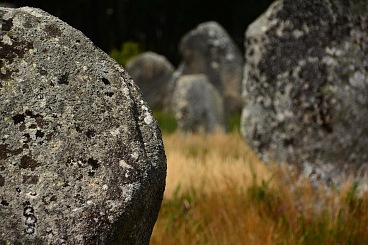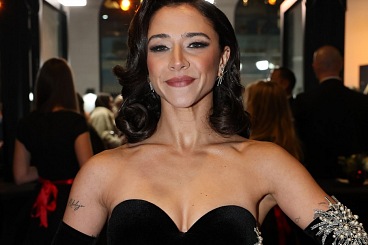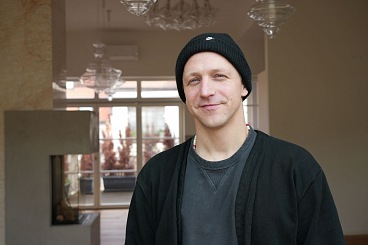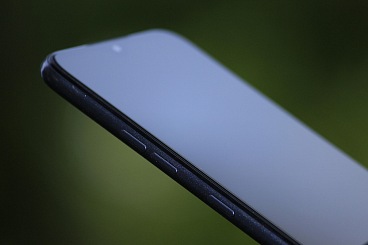Fast Confession - Eva Jiřičná: Not only about her Love for Kaplický
Eva Jiřičná is one of the most notable architects born in Bohemia and a patroness of the Open House Prague festival. Although her life has not always been a picnic, she maintained a kind of detachment and positive approach to life. She managed in London as well as in Prague to build a prestigious architectural studio, with a lot of luxurious buildings under the belt. In the interview with Luxury Prgue Life she opened up about her rather difficult beginnings in London at the time of the occupation, about her life with Jan Kaplický, and why it is necessary to build new modern buildings in Prague.
You are the patroness of the Open House Prague festival, which recently took place. What makes the one in Prague different from the one in London?
I think that they are basically identical. Beginnings in London were very similar to what is now happening in Prague. Nobody wanted to contribute and the institutions that should encourage the event keep withholding any financial support; the owners do not want to open the door. Before they all understand that it makes sense, be beginnings will always be painful. I think that the organisers put in a terrible amount of energy, their own time, physical strength. I keeping my fingers crossed for them and I hope that they will keep going.
How would you briefly describe the Open House festival?
The festival brings the opportunity to become familiar with architecture, old and new buildings, helps to discover solutions of our ancestors, to look at what does modern architecture bring, or where is modern architecture lacking. Architecture is becoming an important part of how to approach the environment and our lives as a whole.
You mentioned how important it is to become involved in the form of the town in which we live. How could one make the city inhabitants to be interested in architecture? They may argue that they have enough of their own worries.
In July this year it will be 50 years that I live in England. That´s half a century, a long enough time. I can compare what did England look like when I came, with what it looks like after 50 years. London has changed fundamentally.
After the war, England was very damaged and only in 1968 it started to recover. There were bombed areas, London was dilapidated, there was no heating in some parts. When I arrived there there was still smog. Yellow mists flooded the entire city, you could not breathe or see properly. All of that changed in the 1950's. And it changed because people started to be interested in their environment. They had to put some energy into it and do minor adjustments on their little patch. And these small projects brought the change about. London also became a financial district, the city went up and up and now it resembles New York more than the old London.
I have not been to Prague for 22 years. When I come here after that time the change for the worse was drastic. Twenty-five years of occupation and the last stage of communism has taken all the energy out of the people, there was lack of investment, the environment was dramatically worse. Thus, it can go left - or right. But if we do not seek each of us to improve that small turf at least a little, that progress will never come. Since 1990, when I first came here, some changes have occurred. Prague is completely different and changes for the better. It concerns all of us. The Open House Prague festival opened up various buildings and everyone was able to find something that interested him and to sort out in his own mind how he would be able to contribute to that change for the better.
Do you agree with the trend to build modern buildings also in historical city parts?
Definitely. Development from primitive architecture to this day represents more or less still the same process. The creative instinct or man to make things, improve and change them is still there. Historic architecture provides testimony of what was happening, or how did our ancestors think. And current architecture shows what we made of it and how will we move on. Sometimes it works well, sometimes it disastrously doesn´t, but we are all trying hard and the more we try, the better our society will be.
How do you think people will live in future, for example in 100 years time?
Terribly hard to estimate. As Woody Allen says: "If you want to make God laugh, tell him about your plans for the future." So the future will certainly be different than I think. Personally I think that we will have less and less things with which we will surround ourselves. I had a grandmother, who had everything in order and always tidy, but there were loads of things that she accumulated during her life. She was convinced that those times and occasions will come back again and the wedding dress will come handy.
Nowadays we move far more often, clinging much less to material things. I have always maintained that everything can be discarded, but not books. But now books are on the internet, so even books will no longer take up so much space.
What is the life of an architect like? Do you have a professional deformation in places that are not connected with your work?
We had one family friend, a doctor, who used to say that in society he always diagnoses people. That he is looking at people thinking whether they perhaps have kidney stones. And architects, whether they want to or not, do something similar. Their whole life they work with clients. An architect can do nothing unless someone gives him a task. Therefore you constantly negotiate with clients who have ordered something, and you have to deduce from the often almost incomprehensible assignment what it really is those people desire.
So you more or less have a look and see. Someone is painstakingly tidy, someone appallingly messy. For you, it of course means something. I cannot prevent applying diagnoses on buildings, new as well as old, but also on people in a tram car. When I sit on a tram I look and I wonder what this person might do for a living. But I am very tolerant, I don´t criticise, I rather try to understand, so I think that this goes hand-in-hand with the profession; it is unavoidable.
We are sitting in the architectural studio AI DESIGN which you established with Mr Vágner. Where are the beginnings of your cooperation?
Petr came to my lecture to Brno, showed me a few examples of his work and I, if I may say so, never say no. He came to the London studio at the time when we were working on the Dancing House in Prague. Then he returned to Bohemia, because he had to start his military service and in the meantime we obtained the project of a Prague hotel, Josef, which we processed in cooperation with the London office. But there was a need for someone to control the construction on a daily basis, so because of this project we established an office in Prague. Next year we will be together for 20 years.
Can you think of any contracts that you would never take on?
I would always avoid something that would have a strictly political sense like the plague. And also if someone asked me to do something with which I would ideologically totally disagree. So far; however, this has not happened.
Which construction are you most proud of?
I am not proud of anything, I think. My mother lived in terrible fear that she will spoil us. When I for example told her that I got an ´A´ grade, she answered: "So what?" Everyone thinks that she was a terrible mother, but I am terribly grateful for that. I have a very critical view on everything that I do, so I never feel as if I hit the nail directly on its head.
But on the other hand, the times are such that an architect alone can do very little. It always depends on all the people involved, not just your colleagues, but the clients, those who will produce it; a whole army of people with whom you interact. And then there will be the result. If someone doesn´t like it, or if it does not work well, it will all be for nothing, although I can boast that according to architectural principles there is symmetry, perfection in detail and the like.
Perhaps this is also due to age and tolerance - and that comes with age. I think it is about the journey, how it proceeds and what is at the end of that road. People must feel good in the given space.
Do you have any professional dream? What would you like to cooperate on?
There is always a dream of doing something that would really mean something, a kind of humanity ´nomination´. We have endeavoured to design an extension for a hospital in Pilsen because of the head physician, Koza; in which he could better treat his patients. He worked in the field of bone marrow.
The daughter of his friend died of leukemia and he built here one of the largest world centres for donors and recipients of bone marrow. He had his own funds, he did not want any State aid, but he died unexpectedly and without his initiative the project collided with the Ministry of Finance and civil servants and all possible obstacles. And that project of his after his death disintegrated and is almost dwindling. It is my dream for this project to be implemented. But it doesn´t have to be done by us, that does not matter.
I would like to go back to the start, to the time you went to England for internship and could not come back because of the occupation. The beginnings must certainly have been difficult. Did you for example have to do other work to make a living?
I was fortunate in that I had the work arranged before I left. The very next day after arrival I started to work in a large design office, where I spent a year. I've lost my nationality and in order to be able to apply for an English passport I had to remain there for 3 years. But in the beginning I had not at all envisaged that I would remain there for so long! I thought that the Russian invasion is something that will take a few months or years, that somebody will come and free us, that a prince and Blaník knights will turn the Russians out of our country, but that of course did not happen, and slowly I got used to it.
At that time you also had your younger brother in England...
Yes I had my 17-year old brother there, harvesting blueberries during his school leave, and when he discovered that they took my passport away, he said that he would not go back, because he would be sent for 3 years of military service and he would never be able to finish his studies. So he remained in England and I am had to look after him. I really was helping him, too, from my really small pay. During the day he studied English and at night he worked as an usher at a cinema. Then when he went to university his university fee was paid, but he had to live off something. For the first few years I worked packaging meat in a supermarket on Saturday mornings, which at least paid for my room. That is what I did for about two years.
Did you have any news at all about what was going on here?
Newspapers published report through similar organisations like the ČTK (Czech press Office). In that large architectural office in London where I worked was installed the very first fax machine at all. It was as big as these two great tables together. There were articles from newspapers, as events were taking place, so I went to read it there. Well and apart from that we read the newspapers.
My father was at that time in Japan, because he worked on a design of the Czech Pavilion in Osaka. He used to say: "I will pick you up kids." But then he was transported through Moscow, his travel permit for England was rejected, so he could not ask for English visa. He returned to Czechoslovakia, then he got gallbladder inflammation, underwent an operation and after the surgery he contracted an infection. He dies in 1972 so we have never seen him again.
It must have been a very difficult period for you...
I do not want to dramatise it, but it was not easy because of the ever-present uncertainty... I did not know whether we would be accepted. There was also fear of foreigners from communist countries. So I really had to work and I had to rely on references of my friends, to provide me with the option to get an English passport. I obtained it in 1976 and my brother too, but until then I did not know what would happen.
At that time was there a lot of Czechs in London?
I did not know very many of them. Of course I knew Jan Kaplický, but my brother studied in Birmingham so he was not even in London. Sometimes have met someone, but the Czechs who sometimes came to London were afraid to meet with us. Even my friends did not let me know. They were afraid that if someone sees them talking to an emigrant, they would be charged once they get back to Czechoslovakia. I did not know many, no.
You mentioned Jan Kaplický, you lived together for ten years. Why did you not get married?
I divorced my first husband named Martin Holub, who, when I arrived in London already had another girlfriend who had managed to get a travel permit before I did. The marriage split immediately after my arrival in 1968. Well with Kaplický we met on the street. I have known him since 1961, we lived together for ten years and then when it no longer worked I packed up my few bits, left everything behind, because I did not want to argue with anyone.
I didn´t want to marry, because the divorce with my first husband had been such a nightmare. I could not have children because I had ectopic pregnancy. Nowadays it perhaps would be a problem but in those days it was. I knew that I couldn´t have any children. And I never wanted to go through another divorce.
Do you consider Jan Kaplický as your life love?
I do not exactly "life love", but he certainly was my most interesting partner, friend and confidant.
What was your life like with him?
He was more or less a very spoiled boy because he was an only child and his parents were older when he was born. He was used to being the centre of everything. That was one side of him. This view of his that he is the centre of the universe did exist.
But on the other hand he was extraordinarily generous. He was not at all materialistic. He shared what he had. On the one hand he was an awesome life partner, on the other hand, the worst one. He simply oscillated, as determined by the genius in him, in the direction in which he developed his talent. He had really huge fluctuations. On the other hand it was interesting, it certainly was not boring.
But from the first moment, which was on New Year's Eve in 1960, we absolutely understood one another in any discussion on architecture. We have been to some cottage, celebrating New Year's Eve, Pavel Bobek was singing there... I have been there with my future husband and he was with his girlfriend Terezka; despite that we have spent the evening talking about architecture, and that remained always - so that was true friendship. The 10 years of our life together was more or less a kind of insert in the long line of friendship.
What kind of relationship did you have after you split up?
We actually stayed friends to the last. He called me in the evening before his daughter Johanna was to be born; he told me that he made a list of people whom he will tell when she is born. But he died on the way from the hospital.
Even though we parted ways, we have never ceased to communicate. Whenever he felt to be in a stressful situation, he called. He always needed someone who would assure him in that he did everything well. Same as all such brilliant people he had a terrible quantity of failures because he was always doing something that failed to be understood and he found it terribly difficult to bear that. He had no mother like me that would have said to him: "So what?"
When something unpleasant happened, it was difficult for him. For example the tender for the National Library, it was terribly hard to bear. When I loose something, I shake it off and press on. Thanks to my mother!

